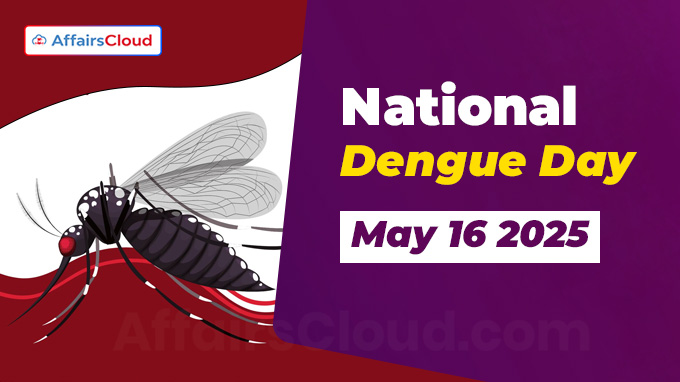 National Dengue Day is observed every year on May 16 across India to raise awareness about dengue fever, a mosquito-borne viral disease, and to promote its prevention and control measures.
National Dengue Day is observed every year on May 16 across India to raise awareness about dengue fever, a mosquito-borne viral disease, and to promote its prevention and control measures.
- This annual initiative is led by the Ministry of Health and Family Welfare (MoHFW), aiming to mitigate the impact of dengue, especially during the monsoon season.
2025 Theme:
The 2025 theme for National Dengue Day is “Act Early, Prevent Dengue: Clean Surroundings, Healthy Living.”
- The theme underscores the importance of early action, cleanliness, and community involvement to curb dengue transmission.
Note: There is no officially declared theme for National Dengue Day 2025, but the above theme is widely mentioned in news sites.
Background:
i.National Dengue Day was initiated in 2010 by MoHFW, in response to the increasing threat of dengue fever across India.
ii.Anti-Dengue Month is observed in July to reinforce community efforts to eliminate mosquito breeding sites.
What is Dengue?
i.Dengue is a viral infection transmitted through the bite of the Aedes aegypti mosquito(female), active primarily during daytime.
ii.Symptoms: High fever, severe headache, joint/muscle pain, skin rashes, and mild bleeding.
iii.Severity: Can progress to dengue hemorrhagic fever or dengue shock syndrome, causing internal bleeding, organ failure, or death, especially in vulnerable groups.
iv.Serotypes: Four strains (DENV-1, DENV-2, DENV-3, DENV-4). Infection with one strain provides immunity only to that type, with subsequent infections increasing severe dengue risk.
Dengue Vaccines:
i.Dengvaxia® (CYD-TDV): Developed by Sanofi Pasteur, this vaccine was first licensed in December 2015 in Mexico for individuals aged 9-45 living in endemic areas.
ii.Qdenga® (TAK-003): Developed by Japan-based Takeda Pharmaceutical Company, this live-attenuated vaccine received World Health Organization (WHO) prequalification in May 2024.
- It is recommended for children aged 6-16 years in settings with high dengue transmission intensity. The vaccine offers protection against all four dengue virus serotypes.
Global Dengue Scenario:
i.As of April 30, 2024, WHO reported over 7.6 million dengue cases globally, including more than 3,000 deaths.
ii.The Region of the Americas experienced a significant surge, with cases exceeding 7 million, surpassing the annual high of 4.6 million in 2023.
iii.In response to the escalating crisis, the WHO launched a global strategic plan in October 2024 to combat rising dengue cases and other Aedes-borne diseases.
Dengue in India:
As per the National Centre for Vector Borne Diseases Control (NCVBDC) under MoHFW, India reported 2,33,400 dengue cases and 236 deaths in 2024.
- Most Affected States: Karnataka, West Bengal (WB), Maharashtra.
- Emerging Trends: Rising cases in Kerala and Tamil Nadu (TN), while some regions show decline compared to 2023.
India’s Dengue Prevention Program:
India’s dengue prevention programme is implemented by NCVBDC under the National Vector Borne Disease Control Programme (NVBDCP), and adopts a comprehensive strategy involving surveillance, vector control, and community participation.
i.Establishment of 805 Sentinel Surveillance Hospitals (SSHs) and 17 Apex Referral Laboratories.
ii.Provision of diagnostic kits (IgM MAC ELISA) through the National Institute of Virology (NIV), Pune (Maharashtra).
iii.Issuance of technical guidelines for clinical management and vector control.
iv.Community awareness programs to eliminate mosquito breeding grounds.
v.Periodic monitoring and advisories for outbreak prevention.
Related Observance:
ASEAN Dengue Day is observed annually on June 15 by the Association of Southeast Asian Nations (ASEAN) to raise awareness about dengue prevention.
- Initiated in 2010 during the 10th ASEAN Health Ministers Meeting in Singapore.
About National Centre for Vector Borne Diseases Control (NCVBDC):
It is the central nodal agency under the Ministry of Health and Family Welfare(MoHFW). It is responsible for the prevention and control of vector-borne diseases across the country.
Director – Dr. Tanu Jain
Headquarters – New Delhi (Delhi)




